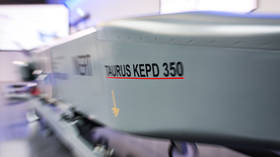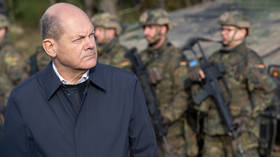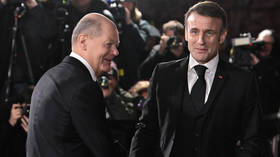Here’s the worst part about the leaked German ‘Crimean Bridge attack’ call

Since Russia has revealed that on February 19 high-ranking Luftwaffe officers discussed – on a basically open conference platform – how German Taurus cruise missiles could strike Russian targets (let’s call it the ‘Taurus Huddle’), the public reaction in the West has taken two main forms: In Germany, the key register has been clumsy damage control; among Berlin’s allies, embarrassment has ensued, as well as barely concealed anger at multiple indiscretions – particularly regarding British and US covert operations in Ukraine.
The allies’ exasperation has come through in scathing headlines such as The Telegraph’s ‘Germany spills British military secrets … using off-the-shelf video phone technology in one of Berlin’s worst security breaches since the Cold War’. Berlin’s fumbling attempts to contain what chancellor Olaf Scholz has called “a very serious” matter have consisted of two insipid moves. First, make it all about Russia: “How wicked, they hacked us!”
Obviously, moralizing about routine eavesdropping among opponents comes across as rather silly from a government that does not mind blown-up pipelines and weaponized de-industrialization between “allies.” The rather whiny complaint also makes the German elite look even more sophomoric. Public Service Announcement for the all-new “Zeitenwende” Germany: Yes, states, especially states against which you are co-waging a proxy war, will gather intelligence on you. If your top brass is klutzy enough to spill the beans via eminently hackable online communications, you’ve only got yourself to blame.
In the same vein, German Defense Minister Boris Pistorius has called Russia’s exposure of Berlin’s shenanigans “a hybrid disinformation attack.” In reality, what inconveniences him is not “disinformation” but the opposite: facts that even Germany has had to acknowledge as authentic. Berlin’s reaction only shows that its and Kiev’s techniques of dodging responsibility are now converging: As it happens, Ukrainian President Vladimir Zelensky has already – prophylactically, so to speak – blamed any future Ukrainian rebellion against his literally catastrophic leadership on Russian “disinformation.” Between German Tweedle-Dee and Ukrainian Tweedle-Dum, the principle is the same: Mess up yourself, blame others (i.e. Russia).
Berlin’s second move to blow smoke over its fiasco is to avoid talking about its substance. Insofar as the content of the Taurus Huddle is even summarized, then only to, misleadingly, claim that it was all harmless routine: Planners will plan, you know; just some hypothetical brainstorming. Moreover, they were merely following orders (an “oldy but goldy” of German political culture) by preparing a briefing for the minister. Again, Pistorius has taken the lead in the whitewash, declaring the officers were “only doing what they are there for.” That, actually, is a stunningly self-revealing statement: If the Taurus Huddle is really part of the ordinary “job” – as Pistorius also put it – of German officers now, everything is so much worse again.
To understand why, we must do what so many Germans love to skirt: Delve into the details of the scandal.
The basics are simple: The recording of the conversation is almost 40 minutes long; there were four participants. Two with high-ranking and important functions: The head of the German air force, Ingo Gerhartz, and the head of the Operations and Training Department, Frank Grafe. Both are generals. In addition, two experts of lower rank (Oberstleutnant) from the Air Operations Command at the Space Operations Center, called Fenske and Frohstedte (or possibly Frostedte), also took part. The discussion details the options for the use of Taurus missiles – formally by Ukrainians, but with irreplaceable German and potentially British and US input – against either the Kerch Strait Bridge or Russian munitions depots. Two participants tend to stress how feasible such operations would be (Fenske and Frohstedte), one – to his credit – is more ambivalent, pointing out obstacles and emphasizing that German involvement is hard to conceal (Grafe). Alarmingly, Gerhartz, head of the air force, can’t detect what he calls a “showstopper,” that is, a clear reason not to launch a covert missile attack on Russian targets via Ukraine.
In the original, the tone is informal and the language often slovenly: an odd hybrid German (a “Kauderwelsch,” as Germans used to say), frequently barely grammatical and saturated with comical calques from English (“to cheat” becomes “den Trick pullen” (to pull a trick); an attack is “doable” as long as the Ukrainians are taught “das Ding zu schiessen,” (to shoot the thing) for instance). Ernst Jünger’s high style this is not.
To get two diametrically opposed misinterpretations out of the way: The discussion does not amount to an explicit conspiracy. This is not a meeting of out-of-line officers openly discussing how to drag their political leadership into a covert cruise missile attack on Russia by using Ukrainian proxies. But that is also the best that can be said about the Taurus Huddle, which is a very low bar. Because – here’s the second popular misunderstanding we need to get rid of – this is not a normal meeting either. These are not, as Pistorius wants to pretend, politically disengaged staff officers dispassionately playing through military thought-experiments (as bad as that would be with this kind of scenario). In reality, the best single phrase to describe the essence of the affair is “gray zone.” Think of it as a messy mix between a rudimentary pretense of professional analysis and a massive dose of bias, politics, and indiscretion.
Perhaps the most striking single feature of the Taurus Huddle is that all participants take breathtaking cheating for granted. No one sees any problems except of a technical nature in the idea of a de facto German attack on Russia as long as German input can be concealed or denied. That is the spirit in which the officers mull over details such as transferring targeting information by either secure data line (oh, the irony…) or maybe personal courier through Poland. (Germans painting a big fat target on Poland for Russians? Qui mal y pense!) Or how the company producing the Taurus (MBDA) could serve as a cut-out to hide the military’s involvement. Their ideas are surprisingly crude, but what’s more important is the sheer criminal energy and boyish recklessness they betray.
In war, all is fair, some may say. But there are two flaws with that response: First, Germany is not, actually, at war with Russia – and the participants of the meeting are not assuming it will be (at least not to begin with, and “the day after” seems not to interest them). Hence, secondly, while deception is a traditional and, principally, legitimate element of warfare, what these officers consider normal is something else, namely replacing deception within a war by covert operations against a state Germany is not and would not be at war with. That is the domain of, perhaps, intelligence services and special forces (and it’s still not a good idea). There are very good constitutional reasons why officers of the traditional military are not even supposed to think of such methods as either admissible or (listen up, Boris Pistorius!) “their job.”
A high point of this attitude occurs when one of the Taurus Huddlers admits that with all the anticipated German training of Ukrainians to handle the German missiles in Ukraine, at least the “first missions” would have to “take place by us in support.” Those who do not know German well may misread this phrase – muddled in the original, not merely in this translation – as simply reiterating that the Ukrainians would need help. But that would be wrong: Read carefully in the context of the preceding discussion, it clearly is a euphemism for Germans actually carrying out at least planning and targeting for these attacks.
Another remarkable feature of the Taurus Huddle is the extreme nonchalance with which highly sensitive and damaging information regarding NATO allies and Ukraine is tossed about. We hardly learn anything surprising about deep British, US, and French involvement in attacks on Russian forces. What is shocking is the slapdash attitude with which German officers shoot off their mouths about these covert operations that are not even their own. As to Ukraine, its air force must have been thrilled to hear the Luftwaffe confirming how few planes of a certain type (“in the single digits”) it has left. It is certain that none of this was news to Russia. But I can imagine Russian officers shaking their heads in a mix of sorry disbelief and wry amusement about their German counterparts.
And last but not least, there is the fact that even moments of realism do not make the Taurus Huddlers stop and think. The meeting features the head of the air force, Gerhartz, himself acknowledging that even if the Taurus were brought into play, their numbers would be limited to a maximum of 100 missiles and that their use would not “change the war,” that is, in Kiev’s favor, of course. Grafe, meanwhile, the other Huddler with a general’s rank, stresses that the Kerch Strait Bridge is not an easy target and may well survive an attack. Futility all around; and admittedly so.
And yet, at the same time, none of them even raises the most serious risk that such an operation would involve. Grafe is worried the media could get wind of the German military’s underhanded methods. Yet that would be child’s play compared with the worst that could happen. Because a strategy of childish-cheating-with-Taurus could, actually, “change the war”: by making Russia give up its policy of turning a blind eye to most of Western de facto belligerency and, instead, start to retaliate, for instance, against Germany.
These are officers sworn to defend Germany. But their only genuine concern seems to be to figure out how to help Ukraine fight Russia, while the risks to which their schemes would expose Germany escape their attention. The first problem here is that, in practical terms, they seem to have lost any sense of the difference between their obligations to Germany and to Ukraine (or NATO, for that matter). The second one is that their defense minister, their chancellor, and much of the German public seem to be unable to make the distinction either. In that sense, the Taurus Huddle may feature in history as a triumph of Ukrainian policy, even if a futile one.
The statements, views and opinions expressed in this column are solely those of the author and do not necessarily represent those of RT.
















